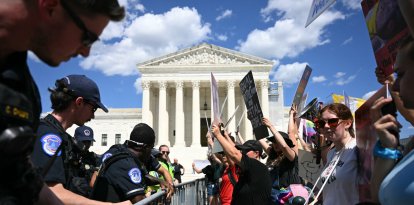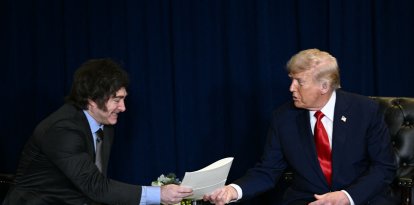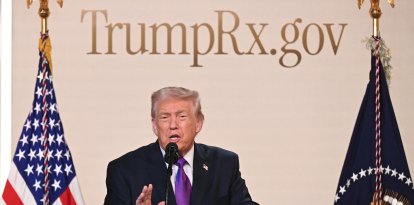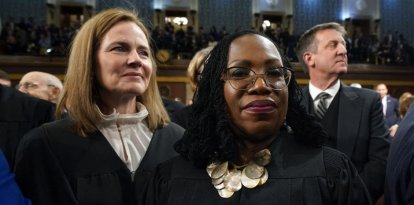Kamala's ideological ambivalence: Friend of Israel or Islamism?
Of concern are her controversial remarks against Israel over the war in Gaza and her underhanded justification of antisemitic protests on college campuses.
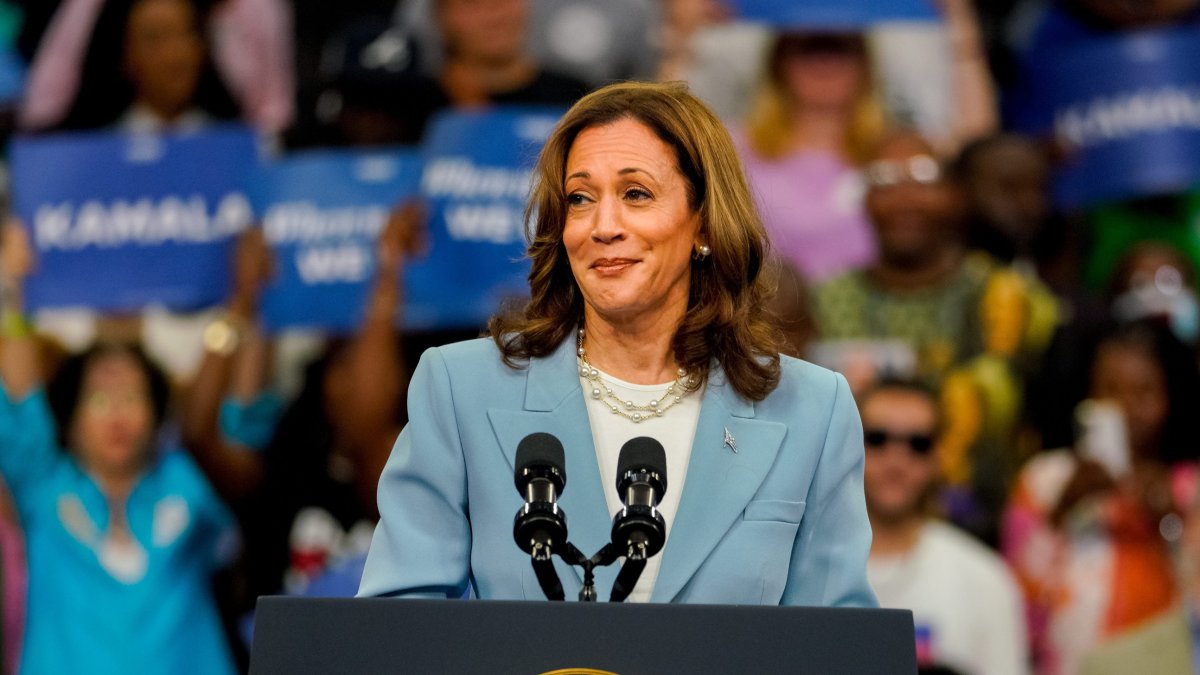
Kamala Harris
Vice President Kamala Harris, who is likely to be the Democratic Party's nominee in the next presidential election, has raised concern among supporters of Israel in its war against Hamas and among those fighting antisemitism, should she take office as U.S. president.
While her husband Doug Emhoff is Jewish, her controversial remarks about the Israeli government's handling of the war in Gaza and her underhanded justification of pro-Hamas protests on U.S. college campuses raise doubts about her support for Israel, one of America's most important allies, and her support in the fight against antisemitism.
In March, Harris said Israel must do more to increase the flow of humanitarian aid to the Gaza Strip and called for an immediate ceasefire, which could strengthen Hamas in negotiations to free hostages and further complicate the Jewish state's war against Hamas and other Palestinian terrorist organizations.
Before Israel launched a large-scale operation in Rafah, on the border between Gaza and the Jewish state, Harris stated that she did not rule out "consequences" against Israel if its military carried out the incursion into the Gazan city. It was an otherwise hostile statement towards Jerusalem.
As mentioned above, the vice president's statements also raise concerns among part of the American (and global) Jewish community, as she subtly defended the anti-Israeli protests on U.S. college campuses, where Jewish students were assaulted. In June, Harris stated in an interview that she understands the "emotions" of pro-Hamas protesters at academic institutions, though she made clear that there are things they say that she forcefully rejects.
Trump claimed that Kamala Harris ‘doesn't like’ the Jewish people or Israel
Following the meeting he held with Israeli Prime Minister Benjamin Netanyahu recently in the United States, Republican presidential candidate Donald Trump claimed, during a meeting with Jewish donors, that the Israeli leader told him that members of the Jewish community in the United States vote for Democrats out of "habit."
Trump also took aim on social media against Kamala Harris for not being present during Netanyahu's speech in Congress and held a "terrible and insulting" meeting with the Israeli prime minister.
The former president surely made reference to Harris' controversial remarks after her meeting with Netanyahu, as the vice president urged to end the war as soon as possible and said she would not remain silent about the suffering of Palestinian civilians. However, she remarked on her "unwavering commitment" to Israel and called Hamas a "brutal" terrorist organization that even committed acts of sexual violence, although she clarified that while the Jewish state has the right to defend itself, "how it does so matters."
Trump added on social media that Harris' "incompetence" would greatly prolong the war in Gaza and prevent the release of hostages held by Hamas.
Following his meeting with Netanyahu, Trump gave a campaign speech in which he claimed that Harris praised pro-Hamas protesters and betrayed Israelis to side with the more radical wing of her party. He added that "she doesn't like the Jewish people. She doesn't like Israel."
Doug Emhoff comes to the defense of his wife Kamala
Recently, Doug Emhoff participated in a video call with the Democratic Jewish Counciland the Jewish Women for Kamala organization to make some clarifications regarding his wife's remarks.
During the conversation, Emhoff maintained that Harris has been, is and will be a strong supporter of Israel as a secure, Jewish and democratic state, and that she will always be concerned with making sure Israelis can defend themselves.
Emhoff also noted that as a Jewish person serving as the second gentleman in the White House, he is committed to fighting antisemitism and shared the pain he felt on Oct. 7.
Kamala Harris reaches out to the Arab-Muslim population.
Kamala Harris is seeking to regain the support of the Arab population in the United States, which has been upset with President Joe Biden because of his support for Israel in the war against Hamas and other Palestinian terrorist groups in Gaza in the wake of the Oct. 7 massacre.
According to a report by ABC, days after Biden withdrew his bid for reelection and endorsed Vice President Harris for the Democratic presidential nomination, senior Republican and Democratic officials have been asking the editor of Arab American News, based in Dearborn, Mich., the city with the largest Muslim population in the United States, whether Harris can win back the support of Muslim citizens in this city.
The newspaper's editor responded that Muslims in Michigan, the state with the largest Arab-American population, will be attentive to Harris' attitudes before making a decision on whether to support him.
Democrats see Michigan as a state where victory is critical in the November elections, so Harris and her team have been holding talks with Muslim community leaders.
ABC noted that Abdullah Hammoud, the Muslim mayor of Dearborn, argued that "the door is cracked open since Biden has stepped down." He added: "There's an opportunity for the Democratic nominee to coalesce the coalition that ushered in Biden’s presidency four years ago. But that responsibility will now fall on the vice president."
Arab-American leaders want Harris to push harder for a ceasefire in Gaza while seeking action from the current vice president to reduce U.S. government support for Israel.
The conflict in Gaza divides the Democratic Party, and this was especially evident during Netanyahu's visit to the United States, where, among other things, he gave a speech to Congress. Some Democrats showed their support for the Israeli leader and others expressed their rejection of Netanyahu's presence. Harris decided not to attend Congress to listen to the Israeli leader's words, which could be interpreted as a nod to the Muslim population in the United States and to the left. In fact, it was precisely this interpretation that was given to her by many members of the Islamic community. The vice president chose to attend an event in Indiana that she had already scheduled in advance.
However, despite her attempts to win the Muslim vote, one of the strong candidates to join her on the presidential ticket is Pennsylvania Governor Josh Shapiro, who is Jewish and has expressed harsh criticism against the pro-Hamas protesters, which represents a real dilemma for Harris.
In February, more than 100,000 Democratic voters in the Michigan primary voted for “uncommitted” candidates, securing two delegates. This happened, of course, in protest against what they see as strong support by the Biden administration for Israel's anti-terror offensives in Gaza in the wake of the Oct. 7 massacre. Nationally, the “uncommitted” vote won a total of 36 delegates.
ABC indicated that the internal divisions were exposed primarily during a recent Democratic Party event in Michigan, where 100 delegates were urged to support Harris. At the gathering, Abbas Alawieh, one of the three state delegates not pledged to Harris, was speaking when another delegate interrupted him by insulting him and demanding that he be silent, Alawieh himself commented.
Kamala Harris: Lukewarm and ambivalent
Kamala Harris' lukewarm or at times ambivalent stance on issues related to Israel and Jews can be explained by her current political ambitions. However, her strong statements against the war being waged by the Israelis in Gaza and her one-sided defense of antisemitic college campus protests ring louder than her criticism of Hamas.
Equating Israel, the only democracy in the Middle East, and Palestinian terrorism is not a stance that benefits the Jewish state, the United States, Palestinians or the world in general.
Lukewarmness and ambivalence toward terrorists and antisemites are signs of weakness, not moderation.
Americans and the world need Harris to speak out clearly on these and other issues. A leader without resolve is not a leader.













